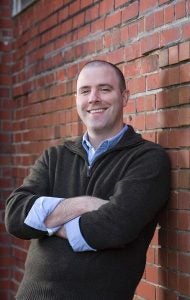ECU professor’s debut novel thrills readers

ECU faculty member Gregory Funaro has published his first novel, “The Sculptor.”
GREENVILLE, N.C. (Jan. 21, 2010) — As a child growing up in Rhode Island, East Carolina University professor Gregory Funaro had long suspected that the statues surrounding his grandfather’s pool came alive at night.
Decades after he was disabused of the notion, the idea of sculptures as living beings — or, rather, living beings as sculptures — stuck with him. It was this memory, recalled while stuck in Fifth Street traffic, that would form the basis of Funaro’s first novel, “The Sculptor” (Kensington Publishing Corp./Pinnacle Books).
“What if somebody made live people into statues?” wondered Funaro, an associate professor of theater. “The idea of serial killing as sculpture and a serial killer obsessed with Michelangelo kind of evolved from that.”
“The Sculptor,” which hit bookstores Dec. 24, introduces readers to Sam Markham, an FBI agent with a knack for tracking down serial killers. Markham is tasked with his most puzzling case yet: A missing professional football player has been found murdered, posed like a famous statue. With art historian Cathy Hildebrant by his side, Markham must find the so-called Michelangelo Killer before he kills again.
That an idea for a thriller would come from a childhood memory is not surprising to Funaro, who believes it’s important for writers to remain true to their voices and experiences.
“You can’t try to guess the market, you can’t try to guess what’s going to sell,” he said. “You’ve just got to write something that you care about, that you love, that you’re passionate about and then worry how it’s going to fit in later.”
So far that philosophy seems to be working. “The Sculptor” has earned accolades from masters of the mystery/thriller genre, including New York Times bestselling authors Gregg Olsen and Kevin O’Brien. Some have drawn parallels between Funaro’s novel and Thomas Harris’ “Silence of the Lambs.” Already, German and Russian language rights to the book have been sold.
The book has been a strong seller at Greenville’s Barnes and Noble, where Funaro signed books Jan. 14. “It’s been selling incredibly well, especially for a first novel,” said Rob McDaniel, community relations manager for the Evans Street location. “For the past week-and-a-half, two weeks, we’ve been getting calls nonstop about it.”
Funaro has a prequel to “The Sculptor” due out January 2011. He also has just finished a third novel, a family saga set in the 1940s that he wrote before “The Sculptor” and recently rewrote completely.
Around ECU, Funaro is known chiefly for his work in the School of Theatre and Dance, where he teaches, acts and directs. He wrote “The Sculptor” in the hours between those duties, usually getting by on four or five hours sleep.
“I just felt like I was on fire doing it,” he recalled. “I was just really excited about the story. I look back, and I don’t know how I did it with that little sleep. There are literally portions of the book that I have absolutely no memory of writing.”
Had he known the travails a first-time novelist faces when trying to get published, Funaro said, he might never have written that first took. “Just to get an agent to read even the first 25 pages, the first chapter, was almost impossible. At least it seemed next to impossible, for me,” he said.
His experience as an actor influences his writing, he said, and helps him develop characters, craft dialogue and overcome writer’s block.
“I would find myself acting out characters as I was writing, especially in the second book, the prequel to “The Sculptor,” Funaro said. “I would find myself talking the way the characters talked, trying to look around my office and see things the way the character might see things.”
Becoming a first-time novelist differs from acting in one important respect, however: the lasting nature of the written word. “In the theatre, if you’ve got a night that doesn’t go very well, you can make it up the next night,” he said. “This an entirely different process. It’s new and exciting and scary at the same time.”